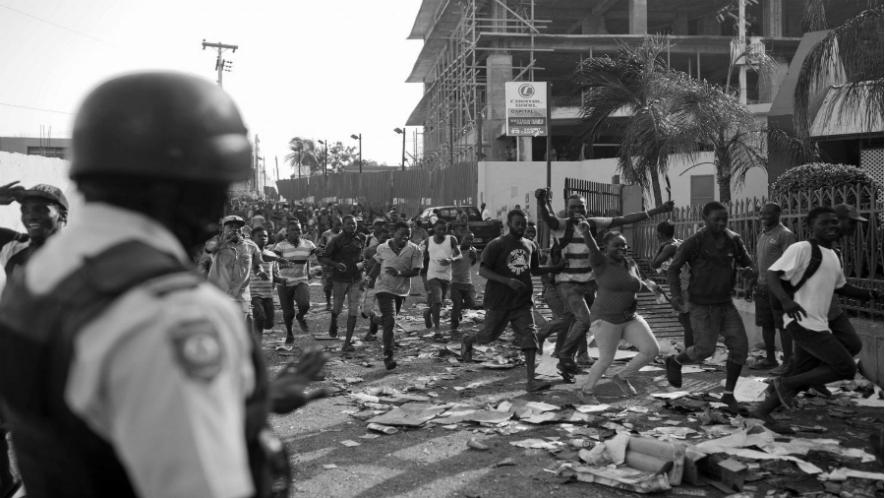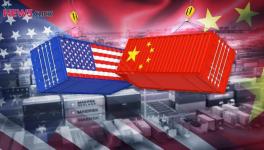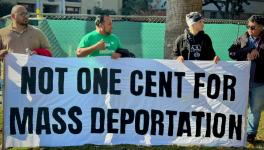Haiti, Imperialism and the War Against Petrocaribe

For the last five weeks Haiti has been experiencing a fuel shortage crisis and of other petroleum products. As a consequence, the population has been affected by the rise in prices of basic products, the partial stoppage of transportation, circulation of contraband and long lines at the gas stations. A gallon of gasoline or kerosene, which is used to light houses in many regions that lack electricity services, can cost two or three times its normal value. The government, commercial and civil activity is currently paralyzed or intermittent. The most affected have been, evidently, the toiling masses that survive with less than two dollars a day in the most impoverished and one of the most unequal countries of the hemisphere.
The absence of hydrocarbons has two central causes. On one hand the retention of fuel by the government, who has exerted pressure to justify the elimination of state subsidies and the increase in prices. This is what President Jovenel Moïse attempted to do in July last year, in accordance with the global policies of the International Monetary Fund. The policy towards Haiti was also replicated in distant countries like Equatorial Guinea and Egypt. This attempt in Haiti resulted in 1.5 million people mobilized in the streets across the country, the suspension of the unpopular measure and the forced resignation of the then Prime Minister, Jack Guy Lafontant.
Despite the fact that in this moment, the executive argued that it was not considering the price increase, it was disseminated in an internal memo of the National Police that called on the special forces of the CIMO (Intervention and Maintenance of Order Corps (Riot Police)) to deal with the eventual protests that would be generated by “the next price increase of petroleum products”. Which is to say, that the principle security corps of the State assumed that the increase would happen a few days ago. At the same time, a reporter from Radio Ibo confirmed, after visiting a port terminal, that the 140 thousand barrels of petroleum that the State had in its possession, had not run out but they were being deliberately retained.
The other cause of the energy crisis is related directly with the regional geopolitics. The blockade and embargo that the United States sustains against the Bolivarian Republic of Venezuela impedes the free navigation of the cargo ships that previously supplied subsidized fuel and under preferential conditions to the Caribbean nation. Without access to cheap crude oil, Haiti has returned to an international market dominated by the North American transnational companies, which impose onerous and impossible prices paid for by the State.
The policy of the US State Department seeks to enclose the government of Nicolás Maduro, and inflict collateral damage to Cuba, that also has been experiencing a moderate lack of supply, and simultaneously weaken the alliance of the member countries of Petrocaribe. The platform of energy cooperation founded in 2005 under the instruction of Hugo Chávez Frias has since been a center piece of Venezuelan diplomacy in the region that the United States considers as mare nostrum, and has hit the commercial interests hard of giants like Chevron and Exxon Mobil.
As such, Haiti is the principle victim and the suicidal instrument of the interventionist policy in the Caribbean under the Trump administration. While Haiti is the most affected by the energy crisis derived from the embargo against Venezuela, it is used as a launch point of the offensive against the government of Nicolás Maduro. At the same time, the government of Jovenel Moïse, clearly preoccupied with the North American priorities, adds to the list of those who seek to weaken and fracture Caribbean Community (CARICOM), which has given reiterated displays of autonomy in the treatment of the decisive Venezuelan question.
Meanwhile, the so-called “international community,” the other countries that have interests in Haiti like France or Canada, and even international organisms that have active presence in the country like the Organization of American States (OAS) and the United Nations, do not seem to acknowledge the gravity of the crisis. While they point out the supposed lack of democracy in countries like Venezuela and Cuba, it seems that they do not recognize the fact that Haiti lacks a stable government, in terms of functionality and with regards to its constitution, since July of last year. The failure of the eight civil and military international missions that act in the country since 1993 is all too clear. By merely looking at the drama in Haiti, one is forced to recognize the overwhelming international responsibility in the critical situation of the country.
Stabilization, reconstruction, pacification, and justice as objectives, have not even been remotely reached, as anyone who has visited Haiti can confirm or observe in the most elemental social and economic indicators. The next and umpteenth mission, the United Nations Integrated Office in Haiti (BINUH) which will replace the current MINUJUSTH on October 16, does not seem to offer greater guarantees in this sense. It is about perpetuating the international occupation of a country that today is considered, according to Article VII of the United Nations Charter, as a ridiculous “threat to international security”. The other objective is to keep on hand an easy resource to new militarizations to repress and contain the massive protests that shake the country and demand the resignation of the president, if these manage to affect the geopolitical interests of the Western powers in the Caribbean.
*Lautaro Rivara is a sociologist and member of the ALBA Movements Dessalines Brigade in Solidarity with Haiti, @LautaroRivara.
Get the latest reports & analysis with people's perspective on Protests, movements & deep analytical videos, discussions of the current affairs in your Telegram app. Subscribe to NewsClick's Telegram channel & get Real-Time updates on stories, as they get published on our website.
























